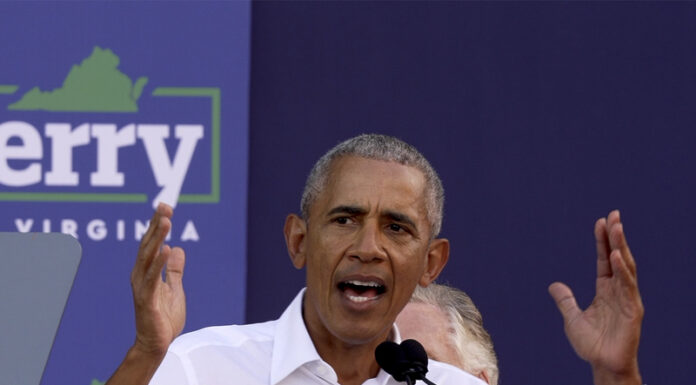In a pointed reply, the White House on Monday, June 16, 2025, rejected former President Barack Obama’s critique of President Donald Trump’s immigration policies, arguing that the public is not interested in Obama’s viewpoint.
Spokesperson Abigail Jackson informed the Daily Beast that if voters had supported Obama, they would have opted for “open‑borders radical, Kamala Harris,” noting, “But it’s President Trump that’s in the White House, and he is fulfilling his promise… securing our borders and deporting illegal aliens.”
The discourse began after Obama used X on Sunday, June 15, to caution against portraying immigrants as foes. He highlighted that his Deferred Action for Childhood Arrivals (DACA) program, created 13 years ago, illustrated “how we can be a nation of immigrants and a nation of laws.”
Obama wrote: “Thirteen years ago, my administration acted to protect young people who were American in every single way but one: on paper,” he stated. He contended that today’s immigrants “just want to live, work, and support their communities” and deserve “treating each other with dignity and respect.”
Following Obama’s post, President Trump took to Truth Social to urge ICE agents to implement the “single largest Mass Deportation Program in History,” targeting “Millions upon Millions of Illegal Aliens,” especially in Democrat-led cities such as Los Angeles, California, Chicago, Illinois, and New York City. Trump claimed that immigrants in these cities influence elections and burden the welfare system, a claim made “without providing evidence.”
Trump stated that he had ordered his administration to allocate all possible resources to this initiative to curb what he described as a destructive wave of migration, which he asserted has turned formerly peaceful towns into places with third-world conditions.
According to a report by Vox, Trump’s deportation numbers remain significantly below Obama’s peak of approximately 438,000 removals in 2013. Despite rhetoric about mass deportations and a proposed $155 billion enforcement plan, Trump has not yet reached Obama’s figures. Vox attributes this to lower border crossing numbers and increased resistance from states and local agencies.
This political discourse coincides with a new wave of intensified ICE operations, particularly workplace raids in Los Angeles, which have led to nationwide protests.
CNN reported that the Department of Homeland Security recently reversed policies that had limited immigration raids at farms, hotels, and restaurants—changes prompted by direct White House pressure to meet enforcement goals.
However, according to a source, during a Monday morning field call, June 16, ICE officials informed field office leaders nationwide that they were required to resume worksite raids. This directive reverses guidance given just days earlier following pressure from industries reliant on migrant labor.
In response, states like California have begun advancing legislation to protect immigrants from federal enforcement, limiting ICE’s access to hospitals, schools, and public areas without warrants. California lawmakers are pushing these bills to minimize ICE’s influence. Politico notes that Democrats are organizing against what they call “military-style operations.”
Public opinion remains divided. A Pew Research Center survey from June 2025 found that around 60 percent of U.S. adults disapprove of Trump-era policies, including asylum restrictions and increased ICE raids, while Republicans largely support these measures. Half of those surveyed said deportations have been “too careless,” and a majority favor a pathway to legal status for undocumented individuals.
Obama’s administration realigned enforcement to focus on undocumented individuals with serious criminal records, keeping total deportation numbers lower while concentrating on public safety threats. In contrast, Trump’s current policy stresses broader workplace and community enforcement but has yet to achieve its mass deportation claims.
Despite Trump’s vocal support for ICE, the data shows a different picture: enforcement numbers remain below Obama’s 2013 peak. Nevertheless, the Trump administration continues to allocate resources toward increasing raids in Democrat-led areas.
This public confrontation highlights an ongoing political divide over immigration enforcement, national identity, and the role of deportation in American society. Obama’s stance emphasizes dignity and legal pathways; Trump’s message focuses on rule enforcement and national security.








